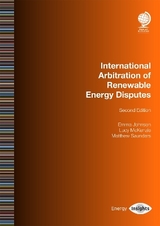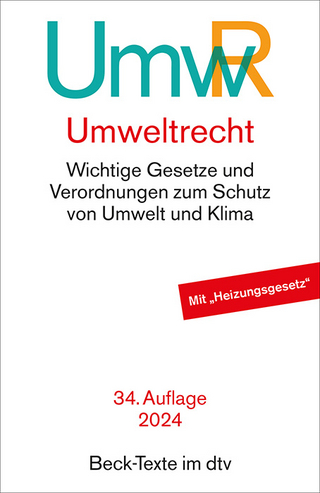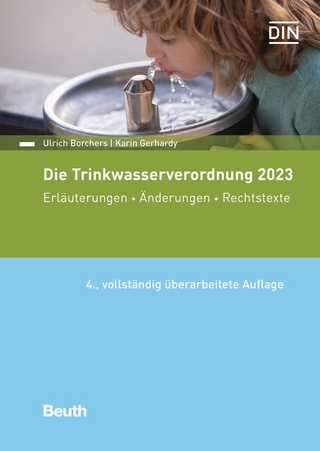
International Arbitration of Renewable Energy Disputes
Globe Law and Business Ltd (Verlag)
978-1-78742-466-1 (ISBN)
- Titel erscheint in neuer Auflage
- Artikel merken
Despite a temporary decline in energy usage and emissions resulting from the confinement policies adopted by many states in response to the Covid-19 pandemic, the world is not on track to meet the Paris Agreement climate change goals. In order to bridge the 'emissions gap' by 2030, the energy industry is critical to achieving the necessary cuts to emissions, however, it must also balance increasing energy demand with the need to achieve sustainability of energy supply for future generations. This requires the industry to transition from dependence on fossil-fuel sources and look to new technologies that underpin a low-carbon economy. Renewables are central to this transition.
The increase in renewable energy capacity globally and the complex and relatively untested nature of renewables projects and the contracts underlying them give rise to a wide range of potential disputes. International arbitration has long been the preferred dispute resolution forum for the energy sector and is well placed to be the leading process for resolving the many and varied disputes that can arise in the lifetime of a renewables project.
In light of the increased prevalence of renewable disputes, this Special Report considers:
•the defining characteristics of renewables projects;
•the scope for disputes to arise in the implementation of these projects at an inter-state, investor-state and commercial level;
•the suitability of arbitration to resolve these disputes, and how its processes can be adapted to resolve them in an efficient and effective way; and
•what the future of arbitration of renewable energy disputes might look like.
Written for both a legal and non-legal audience, this Special Report is relevant to those interested in learning about the scope for disputes in the renewables sector, how they can be avoided, and how arbitration can best be deployed to prevent delay and help push energy transition forward.
Introduction 7
I. An introduction to renewables projects 11
1. What is renewable energy? 11
2. The key players in renewables projects 13
2.1 The project company or consortium 13
2.2 The contractor(s) 14
2.3 Operation and maintenance provider 14
2.4 The offtaker of energy produced 15
2.5 Other participants 16
II. Renewables projects: international law protection 17
1. International investment protection 18
1.1 Bilateral and multilateral investment treaties 18
1.2 Substantive protections 19
1.3 Reference to arbitration 20
2. The renewables cases against Spain, Italy and the Czech Republic 22
III. Common areas of dispute and contractual protections 25
1. Unique characteristics of renewables projects and the scope for disputes 25
1.1 Multiple players and contracts 25
1.2 New and emerging technology 26
1.3 No standardised contracts and the lack of precedent 27
1.4 Relevance of local law and the importance of stabilisation clauses 28
2. Common disputes in the main phases of a renewables project 30
2.1 Disputes in the development phase 30
2.2 Disputes in the construction phase 31
2.3 Disputes in the operation phase 33
IV. International arbitration 35
1. What is international arbitration? 35
2. A final and binding decision 36
3. A decision that can be enforced outside of the parties’ home jurisdictions 38
4. Arbitration is perceived as a more neutral forum for disputes involving parties from multiple jurisdictions 38
5. Appointing arbitrators with relevant expertise 39
6. Flexibility of process 40
7. Privacy and confidentiality 40
8. The choice of forum is clear 41
9. Types of relief available in arbitration proceedings 41
V. Getting the basics right: drafting an effective arbitration agreement 43
1. The scope of the clause 43
2. Multi-tiered arbitration clauses 44
3. The seat (or legal place) of the arbitration 45
4. The procedural rules that will apply 46
4.1 Ad hoc arbitration 46
4.2 Institutional arbitration 46
5. The tribunal 48
6. The choice of governing law 48
7. The law of the arbitration agreement 48
8. Provision for joinder and consolidation 49
9. Provision for confidentiality 51
10. The need for a quick resolution 52
10.1 Emergency arbitration 52
10.2 Expedited proceedings 52
10.3 Summary disposal of unmeritorious claims 53
VI. Top tips in resolving renewables disputes through arbitration 55
1. Use of experts 55
1.1 Identification of remedies and quantification of losses 56
1.2 The importance of early engagement 58
1.3 Tribunal-appointed experts 59
2. Joinder and consolidation 59
3. Document production 60
4. Case management techniques 62
5. ADR techniques 63
5.1 Mediation 63
5.2 Facilitation, conciliation and expert determination of key issues 65
6. Site visits 65
VII. Looking over the horizon: the future of renewables arbitrations 67
1. Energy transition: more claims 67
2. Modernised investment treaties 68
3. The impact of COVID-19 71
4. Changes to arbitration 73
Notes 74
About the authors 85
About Globe Law and Business 87
| Erscheinungsdatum | 16.07.2021 |
|---|---|
| Verlagsort | London |
| Sprache | englisch |
| Maße | 210 x 297 mm |
| Themenwelt | Recht / Steuern ► EU / Internationales Recht |
| Recht / Steuern ► Öffentliches Recht ► Umweltrecht | |
| ISBN-10 | 1-78742-466-9 / 1787424669 |
| ISBN-13 | 978-1-78742-466-1 / 9781787424661 |
| Zustand | Neuware |
| Haben Sie eine Frage zum Produkt? |
aus dem Bereich



